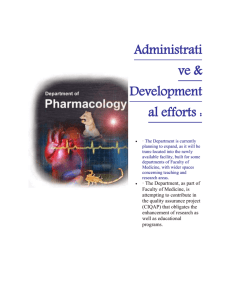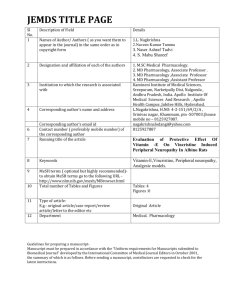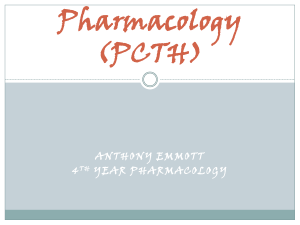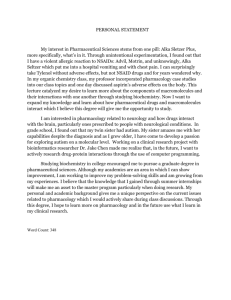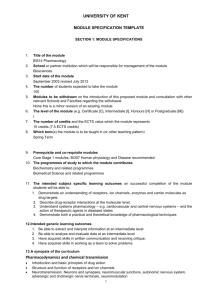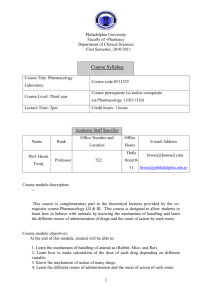M.Sc.Pharmacology
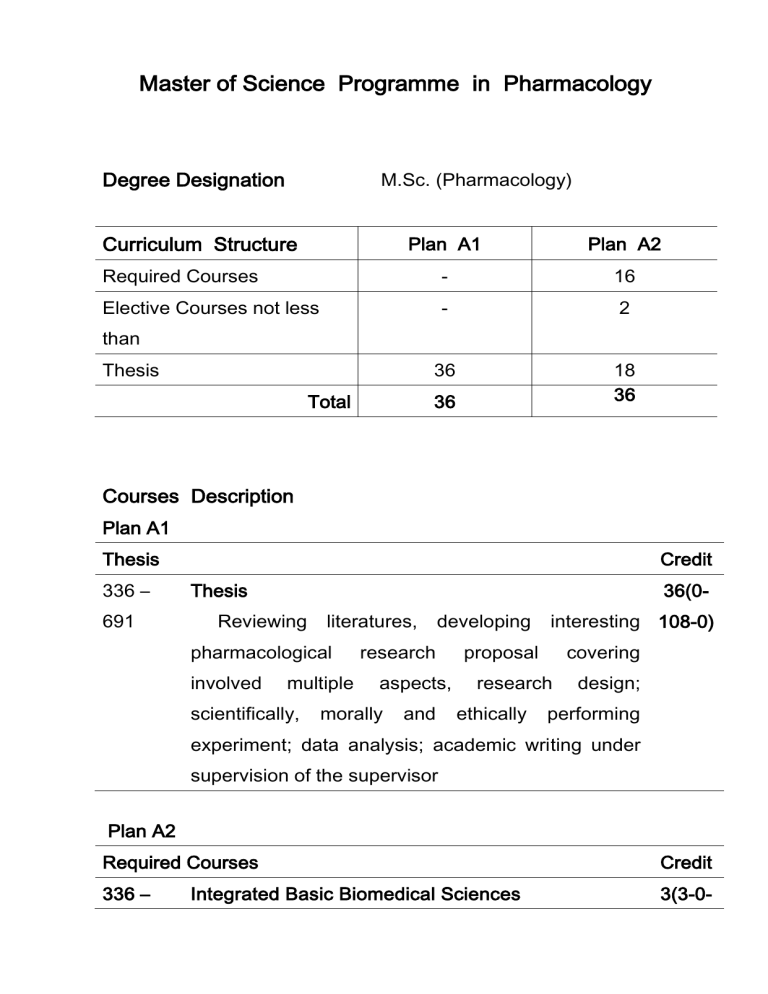
Master of Science Programme in Pharmacology
Degree Designation
Curriculum Structure
M.Sc. (Pharmacology)
Plan A1 Plan A2
Required Courses
Elective Courses not less than
Thesis
Total
Courses Description
-
-
36
36
16
2
18
36
Plan A1
Thesis
336 –
691
Thesis
Reviewing literatures, developing interesting pharmacological research proposal covering involved multiple aspects, research design; scientifically, morally and ethically performing experiment; data analysis; academic writing under supervision of the supervisor
Plan A2
Required Courses
336 – Integrated Basic Biomedical Sciences
Credit
36(0-
108-0)
Credit
3(3-0-
500
336 –
502
336 –
503
Structure and function of cells; organelles; cell communication; cell cycle; program cell death; structure, function and regulation of genetic materials, regulation of gene expression; human development; Structure and function of peripheral
6) nervous system; central nervous system; cardiovascular system; hematopoietic system; respiratory system; gastrointestinal system; endocrine system; reproductive system; renal and water-electrolyte balance control system; immune system; microbial infection
Pharmacokinetics and Principles of Drug Action
Drug transporters, drug transportation across membrane; pharmacokinetics processes; effects of pharmacokinetics alteration on drug response; pharmacokinetic parameters; pharmacokinetic modeling; Theory of mechanism of drug action;
2(2-0-
4) concept of receptors, receptor types, affinity, drugreceptor interaction, structure-activity relationship, non-receptor theory; effect of pharmacodynamics alteration on drug response; drug tolerance; drug dependence; drug allergy; adverse drug reactions
Systemic Pharmacology (Prerequisite: 336-500, 336-
502 )
Pharmacology of drugs acting on peripheral and central nervous systems, cardiovascular system, renal system, gastrointestinal system, endocrine
4(4-0-
8)
336 –
551
336 –
618
336 –
671 system, antimicrobial agents, antiparasitic agents, antineoplastic agents, autacoids and antiinflammatory drugs; dosage forms, drug therapy in pregnancy, nursing mother, infants, children and elderly; application of basic pharmacology to clinical aspects in some topics
Experimental Techniques and Research
Methodology in Pharmacology
(Prerequisite: 3 3 6 -5 0 0, 336-501 , 336-502 or the
Instructor’s approval )
Methods, techniques, animal and non-animal models for pharmacological experiments; data analysis and evaluation; ethical issues in humans and animals experiments; principle and research methodology; statistical applications in pharmacological researches
Advanced Pharmacology (Prerequisite: 3 3 6 -5 0 2 ,
336-503 or the Instructor’s approval)
Concepts and principles of Pharmacology from basics to therapeutic use of drugs and bioactive compounds, important research findings in
Pharmacology leading to new therapeutic applications
Seminar in Pharmacology 1 (Prerequisite: 336-501,
336-502 or the Instructor’s approval)
Presentation of current and interesting
2(0-6-
0)
2(2-0-
4)
1(0-2-
1)
336 –
672
Elective Courses
336 – Pharmacology of Central Nervous System
514
Presentation of current and interesting pharmacological research articles, emphasizing on article selection, progression of an understanding, preparation, presentation, criticism, discussion and answering question, contribution from audients; communication in English
(Prerequisite: 336-500 or Equivalent)
Structure and function of central nervous system, type of neurotransmitters, synthesis, release, mechanism of action and termination of neurotransmitters, physico-chemical properties and pharmacological properties, mechanism of action, clinical uses and adverse drug reactions, trends in central nervous system Pharmacological researches
336 –
515 pharmacological research articles, emphasizing on critical reading, preparation, presentation, discussion, answering question, contribution from student audients
Seminar in Pharmacology 2 (Prerequisite: 336-501,
336-671 or the Instructor’s approval)
Pharmacology of Antimicrobial Agents (Prerequisite: by the Instructor’s approval)
General considerations and classification of antimicrobial agents; structure-activity relationship, mechanism of action, mechanisms of drug
1(0-2-
1)
2(2-0-
4)
2(2-0-
4)
336 –
516
336 –
517
336 –
518
336 –
521 resistance, pharmacokinetics, therapeutic uses and adverse drug reactions of antimicrobial agents, antituberculosis, antifungal, antiviral, anti-amoebic; clinical correlations in some topics; research trends in antimicrobial agents
Endocrine Pharmacology (Prerequisite: by the
Instructor’s approval)
Function and regulation of endocrine system, synthesis of hormones, mechanism of action, hormonal assays, drugs affecting endocrine system, indications, precautions and adverse drug reactions; trends in endocrine pharmacology researches
2(2-0-
4)
Pharmacology of Peripheral Nervous System 2(2-0-
(Prerequisite: 336-500 or the Instructor’s approval) 4)
Peripheral nervous system, neurotransmitters and neurotransmission, receptors; mechanism of action, structure-activity relationship, pharmacological activity, therapeutic uses, adverse drug reactions, contraindications and precautions; trends in peripheral nervous system researches
Instrumentation for Pharmacological Research
(Prerequisite: by the Instructor’s approval)
Theory, principles of scientific instruments and its application for pharmacological researches
Toxicology (Prerequisite: 336-500, 336-502, 336-503 or the Instructor’s approval)
Principle of Toxicology, classification, sources,
1(1-0-
2)
2(2-0-
4)
336 –
605 physico-chemical properties of toxic agents, toxicity evaluation; factors affecting toxicity; dose-response relationship of toxic agents; mechanism of toxicity at molecular, cellular, tissue and organ levels; poisoning diagnosis, toxic signs and symptoms, treatment of poisoning
Pharmacology of Medicinal Plants (Prerequisite: by the Instructor’s approval)
Thai medicinal plants, sources, active ingredients, mechanism of action, pharmacological
2(2-0-
4) activity and adverse effects; factors affecting on pharmacological activity medicinal plants; medicinal plants development processes for therapeutic use; comparative pharmacological study between medicinal plant and drugs, safety of medicinal plants; pharmacological research trends in medicinal plants
Behavioral Pharmacology (Prerequisite: by the 336 –
617 Instructor’s approval)
Neuronal control of behavior; theory of neurotransmitters involved in behavioral changes;
Pharmacology of drugs affecting behavior and drugs used to treat the abnormal behavior; standard methods for drugs affecting on behavior investigation, evaluation of drug efficacy and safety; trends in Behavioral Pharmacology researches
336 – Molecular Pharmacology (Prerequisite: 336-500,
2(2-0-
4)
3(3-0-
641
336 -
642
336-501)
Role of drug transporters and enzymes on pharmacokinetics at molecular level; mechanisms of drug action, molecular structure and function of various types of receptors, cellular signaling, techniques used in ligand binding study, intracellular signalling and its application for classification of receptors and new drug development
Pharmacogenomics (Prerequisite: 336-500, 336-
501, 336-502 or the Instructor’s approval)
Essential human genetics, genetic disorders, the human genome project; effect of alteration of human genomes on drug response; pharmacogenomics of cytochrome P450 enzymes, other drug-metabolizing enzymes, drug transporters, drug targets; clinical significance of genetic polymorphisms; bioinformatics tools; techniques used in pharmacogenomics researches
336 –
681
Special Topics in Pharmacology (Prerequisite: 336-
500, 336-502, 336-503 or the Instructor’s approval)
Interesting topics in Pharmacology of drugs and bioactive compounds, study in depth and cover from the discovery to therapeutic applications; reviewing literatures, presentation and discussion in important issues, integration of knowledge from related fields
Thesis
336 – Thesis
6)
2(2-0-
4)
1(1-0-
2)
18 (0-
692 Reviewing related literatures, developing interesting Pharmacological research proposal, research design; scientifically, morally and ethically performing experiment; data analysis; academic presentation and dissemination to public; research report writing under supervision of the supervisor
54-0)

